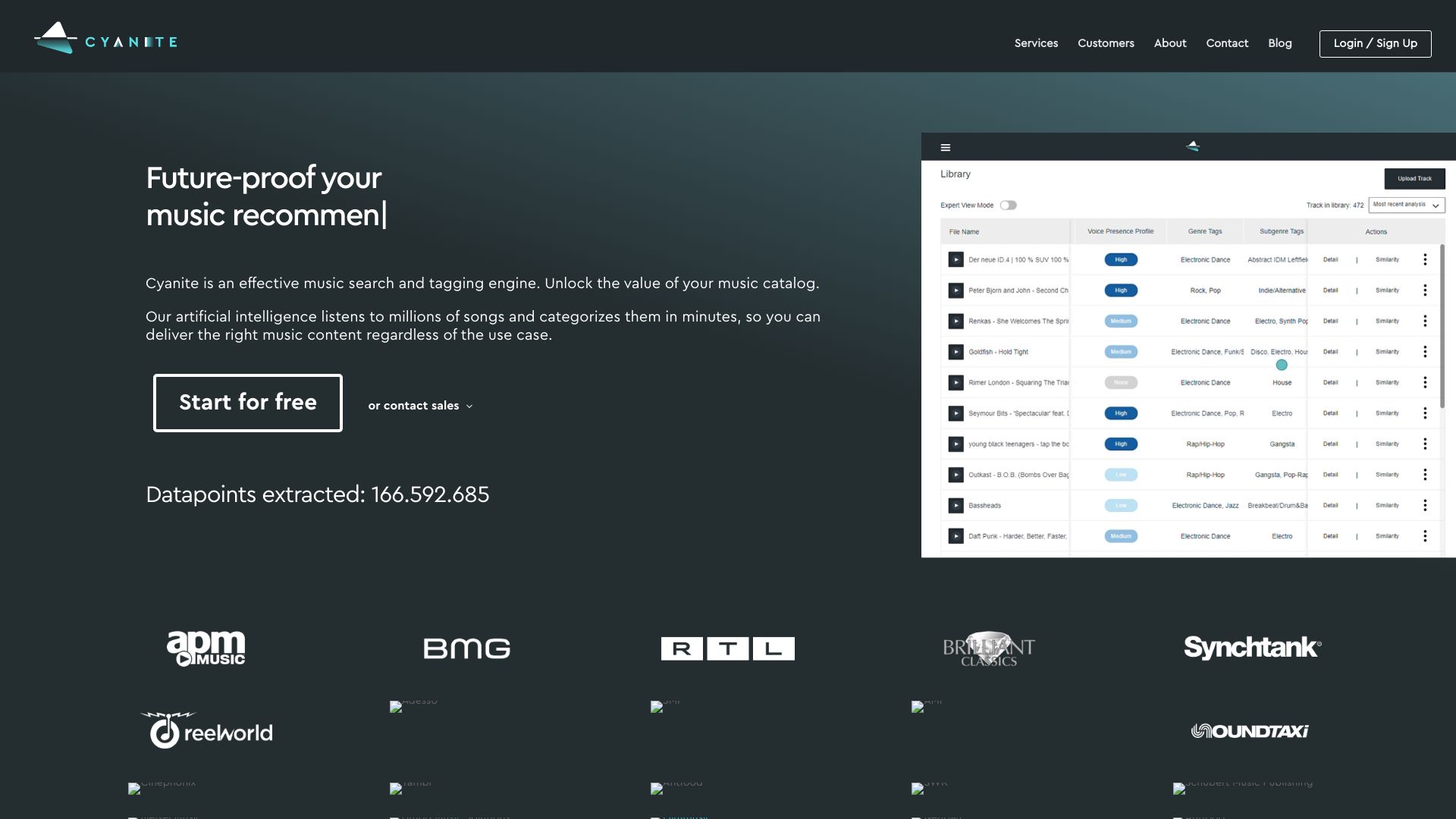- Home
- AI Description Generator
- Cyanite

Cyanite
Open Website-
Tool Introduction:AI music tagging, similarity, and text search for smarter discovery.
-
Inclusion Date:Oct 29, 2025
-
Social Media & Email:
Tool Information
What is Cyanite AI
Cyanite AI is an AI-powered platform for music tagging, recommendation, and similarity search. It transforms complex natural-language prompts into their closest musical equivalents, helping teams discover and organize audio catalogs with speed and consistency. With auto-tagging for mood, genre, instruments, and energy, auto-descriptions for briefs, and visual catalog insights, Cyanite streamlines metadata creation and music discovery. Its free text search and similarity search make it easier to find the right track, improve search relevance, and support scalable music workflows.
Main Features of Cyanite AI
- AI Auto-Tagging: Automatically assigns mood, genre, instrument, and energy attributes to tracks for consistent, searchable music metadata.
- Similarity Search: Find sonically similar tracks from a reference song to speed up replacement, alt-version, or soundalike discovery.
- Free Text Search: Enter descriptive language (e.g., “uplifting indie pop with female vocals”) and get the closest musical matches.
- Auto-Descriptions: Generate concise, human-readable track descriptions suited for briefs, marketing, and catalog pages.
- Visualizations & Insights: Explore catalogs with visual tools to identify clusters, gaps, and opportunities for improved search and discovery.
- Catalog Management: Bulk processing, filters, and facets help clean, enrich, and standardize large music libraries.
- Recommendation Tools: Improve search relevance and discovery experiences with AI-driven music recommendations.
Who Can Use Cyanite AI
Cyanite AI is ideal for music supervisors, sync and licensing teams, labels, and production music libraries that need fast, accurate tagging and discovery. It supports catalog managers and distributors seeking standardized metadata, editors curating playlists or collections, and marketers or agencies who search by mood, genre, and vibe for campaigns. Content teams in film, TV, games, and advertising can quickly find tracks that fit creative briefs using similarity and text-to-music search.
How to Use Cyanite AI
- Import your tracks or connect your catalog to the platform.
- Run auto-tagging to generate mood, genre, instrument, and energy tags at scale.
- Use similarity search by selecting or uploading a reference track to find matching songs.
- Try free text search with natural-language prompts and refine results with filters and facets.
- Review visualizations to spot catalog clusters, gaps, and optimization opportunities.
- Export enriched metadata and integrate the results into your existing catalog or workflows.
Cyanite AI Use Cases
Sync teams match briefs faster by combining text-to-music search with similarity search. Production music libraries standardize metadata and improve client search experiences. Labels and distributors enrich legacy catalogs for better discovery and playlist pitching. Advertising and creative agencies identify tracks by mood, energy, and instrumentation for campaigns. Film and game studios quickly locate alternates or soundalikes that fit narrative or gameplay moments.
Pros and Cons of Cyanite AI
Pros:
- Accurate, scalable music tagging that reduces manual metadata work.
- Text-to-music and similarity search improve discovery and brief matching.
- Consistent metadata enhances catalog organization and search relevance.
- Visual insights help identify catalog strengths, gaps, and trends.
- Supports bulk workflows for large libraries and teams.
Cons:
- AI-generated tags may still require human QA for niche genres or edge cases.
- Results depend on audio quality and existing metadata hygiene.
- Onboarding large catalogs can take time and operational planning.
- Model preferences can influence recommendations without careful tuning.
FAQs about Cyanite AI
-
What types of tags does Cyanite AI generate?
It focuses on searchable attributes like mood, genre, instrumentation, and energy, along with concise auto-descriptions.
-
Can I search by a text description?
Yes. Free text search translates natural-language prompts into relevant musical results.
-
Can I find tracks similar to a reference song?
Yes. Similarity search locates sonically related tracks for alternates and soundalikes.
-
Does it work for large catalogs?
It supports bulk processing and workflows designed for large-scale music libraries.
-
Can I export the metadata?
You can export enriched tags and descriptions for use in your catalog systems and workflows.


